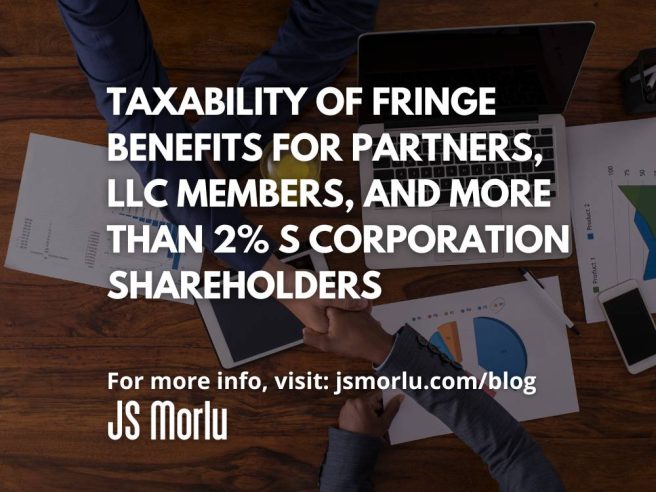By: John S. Morlu II, CPA
Fringe benefits are often seen as an essential component of compensation packages. However, the tax treatment of these benefits varies significantly depending on whether the recipient is an employee, a partner in a partnership, a member of an LLC, or a more than 2% shareholder in an S corporation. While many fringe benefits are excludable from taxation for regular employees, they may be treated as taxable income for these categories of business owners.
For partners, LLC members, and more than 2% S corporation shareholders, the rules can be complex, and it is essential to understand how taxable fringe benefits are reported:
- More Than 2% S Corporation Shareholders: Taxable fringe benefits are added to wages on the individual’s W-2. These amounts appear in Box 1 (taxable wages) but are not subject to FICA taxes.
- Partners and LLC Members: Taxable fringe benefits are reported as guaranteed payments, which are subject to self-employment taxes.
The chart below outlines the tax treatment for specific fringe benefits provided to partners and more than 2% S corporation shareholders.
| Type of Fringe Benefit | Partners | > 2% S Corp Shareholders |
| Accident & health insurance | Taxable | Taxable |
| Achievement awards (tangible property only) | ✓ | ✓ |
| Adoption assistance | Taxable | Taxable |
| Athletic facilities on premises | ✓ | ✓ |
| De minimis benefits | ✓ | ✓ |
| Dependent care assistance (limits apply) | ✓ | ✓ |
| Educational assistance (limit: $5,250) | ✓ | ✓ |
| Employee discounts (limits apply) | ✓ | ✓ |
| Employer-provided cellphones | ✓ | ✓ |
| Group term life insurance | Taxable | Taxable |
| Health savings accounts (limits apply) | Taxable | Taxable |
| Meals — on premises | Taxable | Taxable |
| Meals — de minimis | ✓ | ✓ |
| Moving expense reimbursements | Taxable | Taxable |
| No-additional-cost services | ✓ | ✓ |
| Retirement planning services | ✓ | ✓ |
| Transportation & parking benefits | Taxable | Taxable |
| Working condition benefits | ✓ | ✓ |
Key Notes and Considerations
1. Nondiscrimination Rules: Some fringe benefits, such as dependent care assistance and educational assistance, are subject to nondiscrimination rules. These rules ensure that benefits are provided fairly and not disproportionately to highly compensated employees or owners.
2. Health Insurance Benefits: For partners and more than 2% S corporation shareholders, health insurance premiums paid by the business must be included in their taxable income. However, these premiums may qualify for a deduction on the individual’s Form 1040, provided specific conditions are met.
3. Moving Expenses: The Tax Cuts and Jobs Act (TCJA) suspended the moving expense deduction for most taxpayers from 2018 through 2025. However, active-duty military personnel may still qualify for this deduction under certain circumstances.
4. Meals and Entertainment: Meals provided on the employer’s premises are 50% deductible through 2025, after which they become nondeductible. De minimis meals (such as coffee and snacks) remain fully deductible.
Health Benefits: A Valuable Deduction Opportunity
Health insurance premiums represent one of the most significant fringe benefits for business owners. For self-employed individuals, including partners and more than 2% S corporation shareholders, these premiums may be deducted “above the line” on Form 1040, reducing adjusted gross income (AGI). To qualify:
- The insurance policy must be in the name of the taxpayer or the business.
- The business must either pay the premiums directly or reimburse the taxpayer.
- The premiums must be reported as taxable income in the appropriate manner (either as guaranteed payments or wages).
- The taxpayer must not be eligible for a subsidized health plan through another employer (such as their spouse’s or dependent’s employer) for any month of the tax period.
Given the substantial cost of health insurance, it is vital for taxpayers and their advisors to verify whether these benefits are reported correctly on Schedule K-1 or Form W-2 and to evaluate whether the taxpayer qualifies for the deduction.
Fringe Benefits Beyond Health Insurance
While health insurance often represents the largest fringe benefit, other benefits such as de minimis benefits, dependent care assistance, and educational assistance also provide value. However, taxpayers must be mindful of applicable limits and conditions. For example:
- Dependent Care Assistance: Benefits are subject to annual limits and nondiscrimination requirements.
- Educational Assistance: Up to $5,250 per year can be excluded from income, provided nondiscrimination rules are satisfied.
Summary: Fringe Benefits for Business Owners
C corporation owners typically enjoy more favorable tax treatment for fringe benefits because they are treated as employees. Conversely, more than 2% S corporation shareholders, partners in partnerships, and LLC members taxed as partnerships face stricter restrictions. Fringe benefits that are excludable for employees are often taxable for these business owners, requiring careful reporting.
Tax practitioners must be diligent in identifying fringe benefits and ensuring proper tax treatment. Additionally, understanding opportunities for deductions, such as the health insurance premium deduction, can help business owners offset the taxability of certain benefits. Proper planning and accurate reporting are essential to minimize tax liability and maintain compliance with the complex rules governing fringe benefits for business owners.
Author: John S. Morlu II, CPA
John S. Morlu II, CPA, is the CEO and Chief Strategist of JS Morlu, a globally acclaimed public accounting and management consulting powerhouse. With his visionary leadership, JS Morlu has redefined industries, pioneering cutting-edge technologies across B2B, B2C, P2P, and B2G landscapes.
The firm’s groundbreaking innovations include:
• ReckSoft (www.ReckSoft.com): AI-driven reconciliation software revolutionizing financial accuracy and efficiency.
• FinovatePro (www.FinovatePro.com): Advanced cloud accounting solutions empowering businesses to thrive in the digital age.
• Fixaars (www.fixaars.com): A global handyman platform reshaping service delivery and setting new benchmarks in convenience and reliability.
Under his strategic vision, JS Morlu continues to set the gold standard for technological excellence, efficiency, and transformative solutions.
JS Morlu LLC is a top-tier accounting firm based in Woodbridge, Virginia, with a team of highly experienced and qualified CPAs and business advisors. We are dedicated to providing comprehensive accounting, tax, and business advisory services to clients throughout the Washington, D.C. Metro Area and the surrounding regions. With over a decade of experience, we have cultivated a deep understanding of our clients’ needs and aspirations. We recognize that our clients seek more than just value-added accounting services; they seek a trusted partner who can guide them towards achieving their business goals and personal financial well-being.
Talk to us || What our clients says about us



